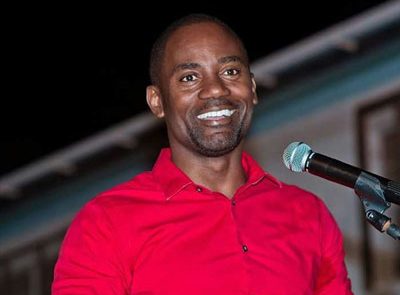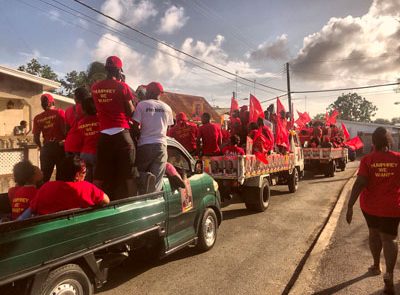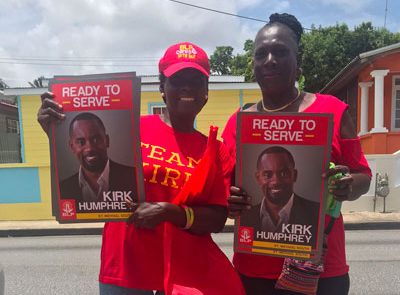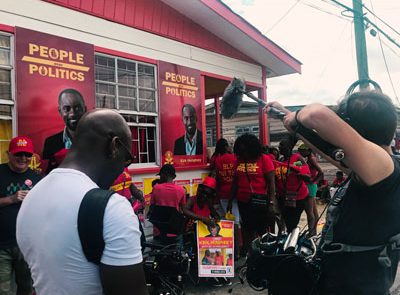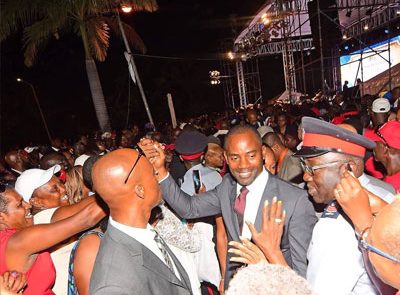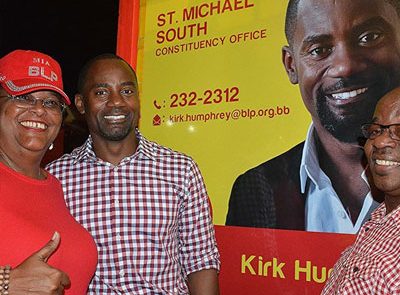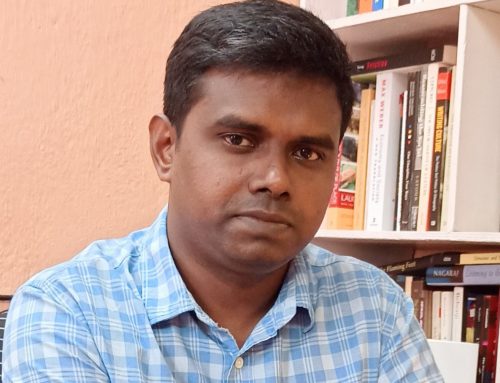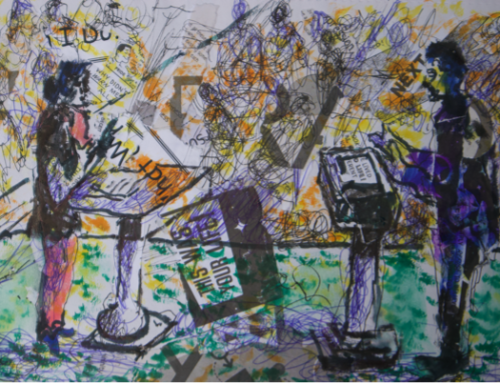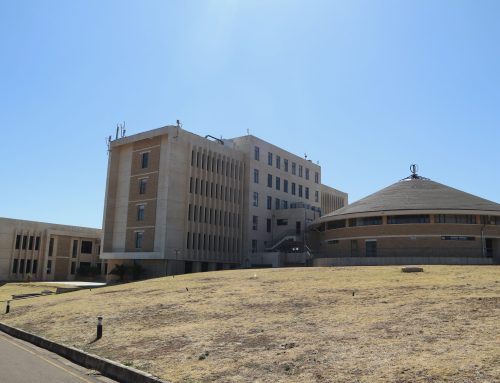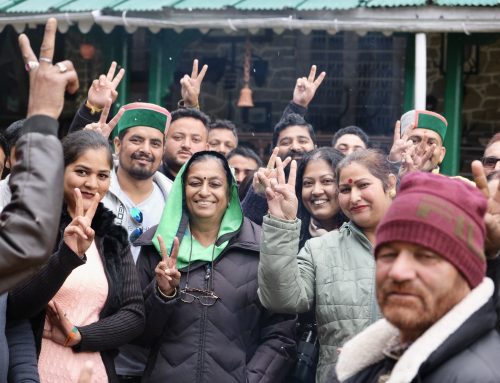 Shalinder Carter reflects on a pivotal moment in Barbadian political history – the May 2018 general election. Granted unrivalled access to the campaign of political newcomer Kirk Humphrey, Carter charts his success in revitalising political engagement amongst an electorate suffering from a surfeit of neglect by their politicians and disillusionment with parliamentary democracy. Humphrey defeated the sitting Prime Minister, and in doing so, argues Carter, he has become a symbol of hope not just for people in Barbados, but for positive and inclusive democratic political engagement everywhere.
Shalinder Carter reflects on a pivotal moment in Barbadian political history – the May 2018 general election. Granted unrivalled access to the campaign of political newcomer Kirk Humphrey, Carter charts his success in revitalising political engagement amongst an electorate suffering from a surfeit of neglect by their politicians and disillusionment with parliamentary democracy. Humphrey defeated the sitting Prime Minister, and in doing so, argues Carter, he has become a symbol of hope not just for people in Barbados, but for positive and inclusive democratic political engagement everywhere.
Kirk Humphrey is a Cabinet Minister in Barbados, who came to power following a dramatic electoral victory against the country’s then sitting Prime Minister. A newcomer to the world of politics, Kirk’s success during the 2018 general election is a compelling example of how a new generation of citizens are committing themselves to overturning the politics of polarisation. Kirk’s progressive and conscience-led approach to politics makes him an important symbolic figure of change during a pivotal moment in Barbadian history. Indeed, against a seemingly rising tide of populist politics around the world, Kirk’s story is one of inspiration and hope for positive and inclusive forms of political engagement.
On May 24th 2018 Barbados elected a new government under the Barbados Labour Party (BLP). The election was regarded as a momentous event in the history of the country for two reasons. Firstly, Mia Amor Mottley became the first female Prime Minister of Barbados. Secondly, she came to power having won a landslide victory against the Democratic Labour Party (DLP), which has governed the country for the last ten years. The DLP defeat in which it lost all of its seats to the BLP, obliterated the party. Meanwhile, the BLP secured all thirty seats in parliament. It was a clean sweep never seen before in the history of Barbadian politics, as well as a totally unpredicted election outcome.
The 2018 elections took place during the greatest economic crisis the country has faced since the Great Depression (1929-1939), which had resulted in widespread poverty and unemployment on the island. Consequently these elections were described by many as the most important since the country’s independence in 1966. Twenty of the thirty successful BLP politicians coming forward to serve during these crucial times were first time candidates with little or no political experience, who were carefully handpicked by the party leader. Many of the candidates were young, and boasted impressive backgrounds and experience across the range of fields considered necessary to drive Barbados forward.
One of the most popular BLP politicians to contest the 2018 election was a young gentleman named Kirk Humphrey – a first time candidate running a grassroots campaign against the then incumbent prime minister, Fruendel Stuart, in the constituency of St. Michael South, which has also been represented by Stuart’s predecessor, Lloyd Erskine Sandiford.
I have made numerous trips to Barbados and made friends on the island, and through them I met Kirk on social media in 2014 which is how we first became acquainted. Kirk and I share a common interest in social equality, and in the power of grassroots movements to achieve this; and he has taken a keen interest in my academic contribution to research and analysis in this field. After I had completed my studies at Cambridge in 2017 I approached Kirk wishing to find out more about his involvement in the upcoming elections in Barbados. My communications with him eventually led to an invitation to go to Barbados to participate in and observe his campaign. I have always known Kirk to be an open and engaging person, but on this occasion I was particularly struck by his willingness to allow me, a British foreigner, such intimate access to his campaign.
I spent three months in the run-up to the election being treated as a member of Kirk’s team – or ‘Team Kirk’ as it was officially known. During that time I also found myself in the midst of the BLP’s national election campaign, constantly surrounded by politicians and key persons associated with the party. I quickly learned that Kirk’s campaign, and in particular his electoral success, was seen by the party at large as critical for the BLP to achieve an overall victory. After all, he carried the greatest load – that of booting Fruendel Stuart out of government. Thus, it was Kirk’s presence in the national campaign that was often highlighted across the country as being uniquely significant in bringing the winds of change to Barbados. In the public eye Kirk was regarded as more than just a political figure, he was like a celebrity, a role model, someone who was lauded as going from “zero to hero”. Some in the public eye even branded him as Barbados’s Barack Obama, despite his being a novice to politics.
Kirk’s nationwide popularity was strengthened by the hard-won support he gained from the people of St. Michael South. Despite two prime ministers spending a total of 20 years in St. Michael South, representation here has often been described as a rather dismal state of affairs; people had become resilient to false promises by their MPs, and as a result politicians generally, and exercised rather high levels of suspicion towards them. At Kirk’s constituency office, where I spent much of my time and was able to speak with a number of constituents, the political neglect they had experienced under previous representatives was an all too familiar story which I encountered time and again. Neglect, along with substantial levels of corruption, seemed to be the norm under the DLP government and left the constituents of St. Michael South, and the ordinary person nationwide, powerless and without agency.
Kirk understood the effects of the DLP political landscape on the average person very well. He was therefore passionate about running a grassroots-oriented election campaign with the goal of empowering St Michael South’s constituents and promoting community action for change. He did so persistently and tenaciously, against the advice of more seasoned politicians whose wisdom and knowledge about such things he recognised and respected. Kirk’s goal was to bring to fruition his “people first” philosophy: that no person should feel diminished under a political system; rather, that people should be placed over politics. Indeed, Kirk created a very popular slogan for his campaign based on this ethos – “People over Politics” – which garnered incredible support not only from those in St. Michael South, but across Barbados. People began speaking of Kirk as a future prime minister.
What exactly made Kirk such a success? In my opinion, Kirk had a number of qualities and achievements which were carefully blended in just the right amounts to produce his exceptional victory, namely, unseating Barbados’ incumbent Prime Minister. First of all, his academic achievements and his record of putting this to use on behalf of the community granted him immediate credibility. He spent ten years lecturing at the University of the West Indies, where he gained his first degree in Business. He also studied Social Policy at the London School of Economics in the UK, as well as Public Administration with a focus on leadership at the Harvard School of Government, both on scholarships and where he gained top marks. These qualifications, combined with his roles in government as Director of Social Policy, Planning and Research and Director of Constituency Empowerment, and most recently as a Senior Development Officer with Global Affairs Canada, reveal the considerable time and dedication he spent sharpening his political tools in preparation for his candidacy in the 2018 General Election. Interestingly, Kirk himself would play his academic success down, which in turn gave him a rather humble persona that did not go unnoticed by the Barbadian people and me.
The second reason for Kirk’s electoral success, based on my personal observations during the campaign, was his natural ability to resonate with constituents. Kirk ran an intense door-to-door campaign to ensure he met every single one of St. Michael South’s residents and that they knew who he was. Despite being represented in Parliament by two successive Prime Ministers, St. Michael South remains one of the most deprived and under-developed constituencies in the country: there are high numbers of people who are unemployed and living in social housing, there are few community amenities, and violence amongst youths and gangs is on the increase. Kirk grew up in an area very similar to St. Michael South called the Pine. He was the youngest of eight siblings raised by a single mother in social housing; and issues such as unemployment, drug abuse and violence were prevalent in his community. Voters in the 2018 election realised that Kirk understood these issues in a very personal way, which is unusual for a well-educated politician. And his ability to connect with ordinary people on these issues helped him gain their trust.
Trust was always going to be one of the biggest obstacles for Kirk to overcome in convincing the electorate in St. Michael South, given the long history of their neglect by politicians. But, based on my observations, Kirk was able – uniquely amongst politicians in Barbados – to form genuine friendships with people which then allowed him to build an earnest and enthusiastic grassroots movement. Furthermore, although he had only to appeal to voters in St. Michael South, Kirk also expended time and energy getting to know people in the surrounding areas. His aim in doing so was to help nurture the revamped BLP’s reputation and relationships with the electorate across as broad a geographical space as possible, and thereby capitalise on people’s steadily growing alignment with the progressive and inclusive nature of the party.
A third reason for Kirk’s political success in the recent election was his focus on making politics an instrument of the peoples will. One constituent, called Victor, a rehabilitated member of the community who had come to be known as Kirk’s right-hand man, explained to me that one of the reasons Kirk’s campaign stood out throughout the national election period was because he made it a fundamental requirement that all campaign plans be developed in partnership with the people rather than being dictated to them. I got the impression that Kirk and his team were in a position of influence within the national party: everyone was watching Team Kirk.
Throughout the campaign, Kirk listened to ordinary voices and made ordinary people’s involvement the driving force behind the power of his campaign. Many of these people had never been involved in politics before; but through Kirk they found themselves on public platforms speaking up for their community. In establishing an ideology based on inclusivity and empowerment of ordinary people, Kirk was effectively also providing a fresh outlook on politics in Barbados. As a consequence, he attracted an exceptionally high level of votes in the 2018 election, including amongst people whose party affiliations traditionally lay elsewhere and those who had spent years in the shadows of self- serving individuals. Through the efforts of Team Kirk, ordinary people either found or reclaimed their voices – and made themselves heard.
I spent many occasions during the campaign with Kirk himself and was able to gain a good insight into what motivated him. Kirk told me that he was never really into politics since he had grown up with constant reminders of how the political system was failing ordinary people. So why get into politics, I asked him. “I just generally believe that political service is…at its core is the best way to improve the lives of ordinary people”, he replied. Kirk’s underlying sentiment was that, although political mechanisms are flawed, real political action happens when the establishment is rattled. Involving local people in St. Michael South in his political campaign, indeed making them the beating heart of it, was strategically imperative in order to foster real and positive political change in the constituency.
There is no doubting that Kirk’s strategy revolutionised politics in Barbados. But for him, political action is not just about lobbying for political change, it is also about empowering the ordinary person: “I don’t respect, to be honest, the systems that exist outside of a person that serve to limit a person. Nor do I respect the systems that exist inside of a person that serve to limit a person”. He believes in dismantling both the internal and external limitations that prevent people from reaching their full potential. His strategy for success can therefore be read as: placing people at the forefront of action and change, building genuine grassroots politics and making it mainstream, part of the norm of political action.
There were, however, aspects of Kirk’s personality that added a level of allure and attractiveness to his campaign. Unlike other candidates I observed, Kirk has an air of charisma and enigma that draws people to him, that makes them want to listen to what he has to say. He is also a genius with words, drawing upon his private indulgence as a poet to produce a kind of lyrical oratory. He flirts with, and plays on, words seemingly effortlessly and takes to the podium without notes, thereby giving his speeches a sense of being alive and in motion, rather than seeming rehearsed. Indeed, he often doesn’t rehearse his speeches as a result of writing them (sometimes) barely an hour beforehand. Furthermore, there is poetry to Kirk’s speeches; he inspires and taps into people’s raw emotions, and is able to move them. Consequently, he has attracted large followers, exceeding the expectations of seasoned political pundits and many others.
Defeating a sitting prime minister in their own constituency was something that had never been done before in Barbados before Kirk, and as a first-time candidate the odds were stacked even higher against him. Yet Kirk was able to shift the conversation from questions of “How will Kirk beat the prime minister?” to “How will the prime minister beat Kirk?”
Non-populist, grassroots politics is becoming more and more prominent, despite the increasingly polarised world around us, and Barbados with all of its nuances provides one example of this. Another example is that of the United States, where Democratic socialist Alexandria Ocasio-Cortez, ran a door-to-door campaign in Brooklyn, New York, which helped her unseat the high-ranking incumbent Joe Crowley. Like Fruendel Stuart in the St. Michael South constituency that Kirk was contesting, Crowley was widely considered a shoo-in for re-election in Brooklyn. The magnitude of Ocasio- Cortez’ victory – similar to that of Kirk Humphrey in Barbados – cannot be underestimated. They each demonstrate how grassroots political campaigning can lead to quite dramatic outcomes.
Grassroots political campaigning is vital in helping speak truth to the power of incumbent elites, and to deep, pervasive, inequality-based political structures. In Barbados, Kirk Humphrey has shown the way by mounting a heroic people-led onslaught against the country’s hegemonic political structures and personalities. We should take note of such movements, and of the ‘people over politics’ ethos that underpins them, if we want to better understand how to preserve democracy.
On 28th May 2018, the Honourable Kirk Humphrey was sworn into parliament in Barbados as the Minister of Maritime Affairs and the Blue Economy, and as the representative of St. Michael South. He continues to charm listeners with his speeches in parliament, and never forgets the people who put him there.

